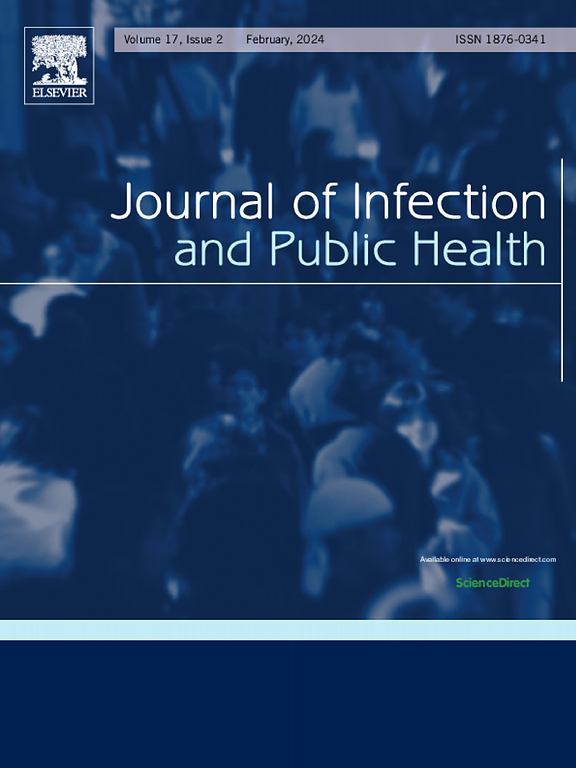巴林初级卫生保健中心抗菌药物管理方案的影响——5年经验
IF 4
3区 医学
Q1 INFECTIOUS DISEASES
引用次数: 0
摘要
抗生素滥用在全球范围内通过驱动耐药性、增加成本和恶化结果来挑战医疗保健。抗菌药物管理(AMS)计划优化使用。这项前瞻性干预性研究概述了巴林初级卫生保健(PHC)设施的五年抗菌药物管理计划(ASP)。方法在巴林政府初级保健中心进行前瞻性介入研究,评估新实施的ASP对抗菌药物使用和成本的影响。从2015年开始,ASP包括对处方模式和资源的情景分析。成立了一个多学科团队,指导医疗辅助队的活动,发展教育项目,建立临床指南,创建电子处方报告系统,并提供处方趋势反馈。该研究分析了抗菌药物处方订单报告,并评估了2016年1月至2021年9月期间开出的所有抗菌药物,评估了每1000名居民的抗菌药物处方、每1000名居民的限定每日剂量(DDD)和抗菌药物成本。结果2016年1月至2021年9月共开具处方2032 653张,其中以青霉素类(68.74% %)、头孢菌素类(18.13 %)和抗寄生虫类(9.43 %)最为常见。在整个研究期间,70%以上 %的初级保健处方来自世卫组织推荐的可及性类别。在辅助医疗系统干预后,处方减少了4.5倍,从每1000名居民67.6张处方减少到15.1张处方,除呋喃妥英外,所有抗菌药物类别均有统计学显著减少(P <; 0.001)。DDD/1000居民和成本也显著下降(P <; 0.001),节省约410万巴林第纳尔(1097万美元)。结论首次公布的东地中海国家初级卫生保健ASP显著降低了抗微生物药物处方和DDD/ 1000居民。领导支持、多方面干预和积极的多学科参与是在国家层面维持和改善成果的关键。进一步的分析可以确定额外的差距和必要的系统变更。本文章由计算机程序翻译,如有差异,请以英文原文为准。
Impact of an antimicrobial stewardship program in primary health care centers in Bahrain – A 5-year experience
Background
Antimicrobial misuse globally challenges healthcare by driving resistance, escalating costs, and worsening outcomes. Antimicrobial stewardship (AMS) programs optimize use. This prospective interventional study outlines a five-year antimicrobial stewardship program (ASP) in Bahrain’s primary health care (PHC) facilities.
Methods
A prospective interventional study was conducted in Bahrain’s governmental PHC centers to evaluate the impact of a newly implemented ASP on antimicrobial use and cost. Starting in 2015, the ASP included a situational analysis of prescribing patterns and resources. A multidisciplinary team was formed to guide AMS activities, develop educational programs, establish clinical guidelines, create an electronic prescribing reporting system, and provide feedback on prescribing trends. The study analyzed antimicrobial prescription order reports and evaluated all antimicrobials prescribed between January 2016 and September 2021, assessing antimicrobial prescription per 1000 inhabitants, defined daily doses (DDD) per 1000 inhabitants, and antimicrobial costs.
Results
A total of 2032,653 prescription were ordered between January 2016 and September 2021, with penicillins (68.74 %), cephalosporins (18.13 %), and antiparasitics (9.43 %) being the most common. Over 70 % of the PHC prescriptions were from the WHO-recommended Access category for the whole study period. After AMS interventions, prescriptions decreased 4.5-fold, from 67.6 to 15.1 prescriptions per 1000 inhabitants, with statistically significant reductions (P < 0.001) in all antimicrobial classes except nitrofurantoin. The DDD/1000 inhabitants, and cost also decreased significantly (P < 0.001), saving around 4.1 million Bahraini Dinars, ($10.97 million).
Conclusions
The first published country wide ASP in primary health care in the Eastern Mediterranean significantly reduced antimicrobial prescriptions and DDD/ 1000 inhabitants. Leadership support, multifaceted interventions, and active multidisciplinary participation are key to sustaining and improving outcomes at a country scale. Further analysis can identify additional gaps and necessary system changes.
求助全文
通过发布文献求助,成功后即可免费获取论文全文。
去求助
来源期刊

Journal of Infection and Public Health
PUBLIC, ENVIRONMENTAL & OCCUPATIONAL HEALTH -INFECTIOUS DISEASES
CiteScore
13.10
自引率
1.50%
发文量
203
审稿时长
96 days
期刊介绍:
The Journal of Infection and Public Health, first official journal of the Saudi Arabian Ministry of National Guard Health Affairs, King Saud Bin Abdulaziz University for Health Sciences and the Saudi Association for Public Health, aims to be the foremost scientific, peer-reviewed journal encompassing infection prevention and control, microbiology, infectious diseases, public health and the application of healthcare epidemiology to the evaluation of health outcomes. The point of view of the journal is that infection and public health are closely intertwined and that advances in one area will have positive consequences on the other.
The journal will be useful to all health professionals who are partners in the management of patients with communicable diseases, keeping them up to date. The journal is proud to have an international and diverse editorial board that will assist and facilitate the publication of articles that reflect a global view on infection control and public health, as well as emphasizing our focus on supporting the needs of public health practitioners.
It is our aim to improve healthcare by reducing risk of infection and related adverse outcomes by critical review, selection, and dissemination of new and relevant information in the field of infection control, public health and infectious diseases in all healthcare settings and the community.
 求助内容:
求助内容: 应助结果提醒方式:
应助结果提醒方式:


